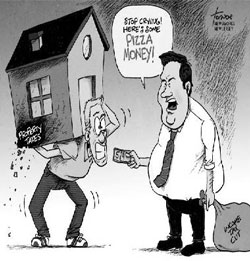New Jersey Governor Chris Christie is proposing a new tax plan for all residents, which will be the focus for his upcoming campaign. The plan proposed is a compromise from the last tax cut he proposed in order to settle the plan with the state Democrats and Republicans.
Last year, the Governor proposed a plan that would cut 10 percent across the board on income taxes. The state’s lawmakers informed him they would prefer tax cuts that link to property instead, to which he agreed. However, the deal did not pass because lawmakers and economists were fearful of the revenue’s projections being too optimistic.
His new plan is based off of the one from last year, to which Christie put the tax cuts into property taxes. The major difference in the plan, however, is the benefit it will be to higher-income households. The old plan called for household’s making $250,000, the new plan raised up to $400,000.
The plan calls for increasing the state’s earned income tax credit to 25 percent of the federal level, raising it five percent from the 20 percent that is currently is today. The Governor was the one to drop the income down to 20 percent in 2010, but now worked with lawmakers to move it back to its original 25 percent.
The plan aims mainly at middle class and higher earners. For example, households earing up to $400,000 would collect an income tax credit equal to 10 percent of their property tax bill, which would be refundable and capped at $10,000. Typically, New Jersey homeowners are the ones to pay the highest average in property taxes. Last year, the property tax bill was at $7,900.
New Jersey residents that are qualified for becoming homeowners will start off with $100 credit for the last half of the year 2013, which will elevate to four percent of their property tax in 2014, then to eight percent in 2015, and eventually allowing them to catch up to the current homeowners with 10 percent in 2016. The credit will also increase for renters, moving up from the already set price of $50 to $200 by 2015.
Professor of Economics and Financing Steven Pressmen believes the plan to be good politics, but poor economics.
“The first issue is that the state of New Jersey must balance its budget. That means the money for the tax cuts cannot be borrowed. If we cut taxes for some people, the government needs to get the revenue from elsewhere. Since the Governor is not willing to increase taxes on the very wealthy to pay for tax cuts to the working poor and the middle class, that only leaves spending cuts as a way to fund the tax cuts,” said Pressman.
Pressman continued, “There are lots of ways to do this, but here are some likely possibilities. State employees will be laid off or their salaries reduced to pay for their tax cut. Most likely, state aid to colleges and universities will be cut and tuition at all state universities will rise. There will probably be a push to cut spending for the public school system in NJ (one of the best in the country). At bottom, the economics of the plan does a little more than give money to New Jersey residents with one hand and then have to take away the money with the other hand in order to balance the state budget. Back to the brilliant politics briefly, the tax cut plan stipulates that if the money is not there for the tax cuts, the state (Democratic) legislature will be required to rescind the tax cuts– the Governor will not get involved at all.”
According to Pressman, the budget cuts that will be necessary to pay for the tax cut, will only hurt unemployment of the state. Pressman explains, “The second issue concerns the big problem in NJ now, which is unemployment. At present, the state has one of the highest unemployment rates in the nation, nearly 10 percent. And it is one of the very few states in the nation where unemployment has actually risen over the past year (in the nation it has fallen considerably). As a whole, taking into account both the tax cuts proposed and the spending cuts that will be required to pay for them, I see nothing in the plan that will lead to more job creation. If anything, it is likely to make things a little bit worse.”
Pressman resumes, “Technically, this issue is called ‘the balanced budget multiplier’ by economists.
Pressman offered an example of if someone receives a tax break. He said that if someone is given a $1,000 tax break, they will save some of it. However, that $1,000 must come from somewhere, Pressman explains.
Pressman continues that this could cause workers to be laid off leading to unemployment rising.
Pressman concludes, “In sum, brilliant politics and dumb economics.”
Samuel Maynard, junior political science major, said, “While a tax cut may be popular politically, it will not do much to stimulate the economy.”
Maynard sees three main problems with the plan. He said that unemployment may climb higher than the 9 percent it currently sits at, which is one of the highest in the country. He also mentions that with a tax cut, there must be spending cuts, which may come from places such as education and that despite being given the tax cuts; there is no guarentee that those who receive the cuts will save it.
Maynard continued, “While a tax cut may be popular politically, it will not do much to stimulate the economy.”
IMAGE TAKEN from http://www.newsworks.org


